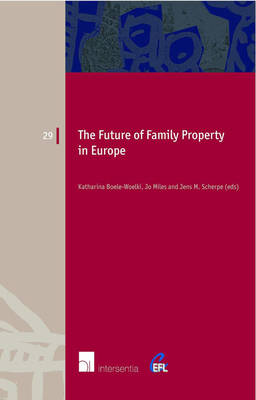
- Afhalen na 1 uur in een winkel met voorraad
- Gratis thuislevering in België vanaf € 30
- Ruim aanbod met 7 miljoen producten
- Afhalen na 1 uur in een winkel met voorraad
- Gratis thuislevering in België vanaf € 30
- Ruim aanbod met 7 miljoen producten
Omschrijving
This book covers five areas of family property law in Europe:
- Matrimonial Property Law in Europe,
- Family Contracts – Issues of Autonomy,
- Protection of Older People in Law,
- Freedom of Testation and Protection of Family Members, and
- Unification of Private International Law.
All of these issues are highly relevant as Europe is at a key stage in its development, with all societies experiencing broadly similar demographic trends and facing the social and legal policy challenges that accompany them. The increase in international mobility and multi-jurisdiction couples poses both increased pressure to provide private international law solutions, and prompts calls for substantive harmonisation. The high divorce rate in many jurisdictions means that matrimonial property and maintenance issues affect more families. Other social changes, such as increased maternal labour market attachment, invite reconsideration of the basis for financial relief between spouses on divorce. All jurisdictions are also experiencing growth in cohabitation and extra-marital births. In short, family structures are becoming more complex. This raises questions concerning the division of property both on separation and on death, where the appropriate priority amongst the diverse range of surviving family members needs to be resolved. Moreover, as fertility rates decline and populations age, increasing numbers of older people require costly personal and medical care, prompting a new set of questions for law and society to resolve.
These issues are discussed throughout the book, together addressing the broad question: what might be the future of family property law in Europe?
This book contains the papers presented at the fourth conference of the Commission for European Family Law, which took place in Cambridge, UK in April 2010.
About the book
‘Written in English, ‘The Future of Family Property in Europe’ is the 29th book of the Intersentia series in Family Law and benefits from well-expressed arguments, clarity and thoughtfulness throughout. [For the library it is essential if the institution purports to deal in legal matters European. Would I recommend it? Oh yes, indeed I would.’
Penny Booth in 2011 European Family Law
‘This is a worthwhile read. [The book] starts with a brilliantly written contribution from Lord Justice Thorpe […].’
Dieter Henrich in Zeitschrift für das gesamte Familienrecht (FamRZ) 2012, 1463
Specificaties
Betrokkenen
- Auteur(s):
- Uitgeverij:
Inhoud
- Aantal bladzijden:
- 434
- Taal:
- Engels
- Reeks:
Eigenschappen
- Productcode (EAN):
- 9789400000544
- Verschijningsdatum:
- 22/04/2011
- Uitvoering:
- Paperback
- Afmetingen:
- 160 mm x 240 mm
- Gewicht:
- 730 g

Alleen bij Standaard Boekhandel
Beoordelingen
We publiceren alleen reviews die voldoen aan de voorwaarden voor reviews. Bekijk onze voorwaarden voor reviews.







